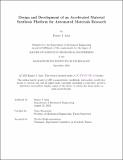Design and Development of an Accelerated Material Synthesis Platform for Automated Materials Research
Author(s)
Aissi, Eunice I.
DownloadThesis PDF (31.81Mb)
Advisor
Buonassisi, Tonio
Terms of use
Metadata
Show full item recordAbstract
Materials development is the foundation for innovation in many industries and fields, however, this process is traditionally slow and resource-intensive. Most often, new materials are developed and characterized on the time scale of years which can limit the pace of scientific and industry innovation. I address the material synthesis and characterization bottleneck by presenting a framework that I believe is suitable for smaller labs: Self-built, low-cost automation. The design philosophy is to de-risk the lab automation process by keeping costs low, failing fast, and leveraging common resources in electronic systems and additive manufacturing. I present an improved version of a low-cost but high-throughput inkjet material printer developed by Siemenn et al. and adapted to operation in the glovebox, hood, and benchtop environments. The tool is capable of depositing gradients of droplets with unique compositions at a rate of up to 1000 materials per minute, is self-built, and costs around $500. I also present a computer-vision-enabled high-throughput material characterization algorithm for stability quantification through color degradation. The synthesis and characterization methods are validated on a methylammonium lead iodide (MAPbI3) and formamidinium lead iodide (FAPbI3) perovskite material system. X-ray diffraction (XRD), X-ray photoelectron spectroscopy (XPS), and hyperspectral imaging measurements show equivalence between high-throughput synthesis and more traditional spin-coating methods. Results obtained through the high-throughput stability characterization method are aligned with stability trends reported in the literature and have an accuracy of 96.9% when compared to ground-truth degradation as measured by a domain expert.
Date issued
2024-09Department
Massachusetts Institute of Technology. Department of Mechanical EngineeringPublisher
Massachusetts Institute of Technology